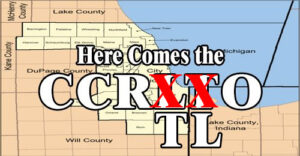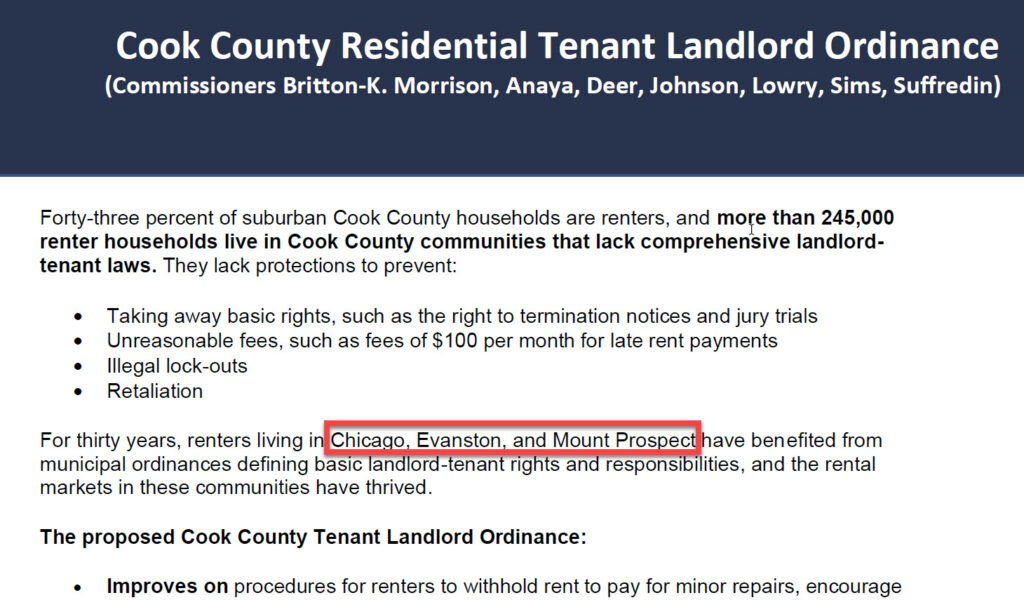 Are Suburban Landlords Ready?
Are Suburban Landlords Ready?
Like it or not, it is June 1, 2021 and the Cook County Residential Tenant and Landlord Ordinance is now in full effect. Between the time the ordinance was passed and now, lawyers and politicians have discussed this ordinance in a number of forums. I wanted to provide a few quick thoughts on two issues I believe housing providers should consider as the ordinance dawns.
The “Old Lease” Problem
There has been a lot of discussion as to whether or not the ordinance should apply only to leases executed on or after June 1, 2021. On April 29, 2021, Cook County held a Facebook meet featuring Toni Prekwinkle, Commissioner Scott Britton and Commissioner Kevin Morrison. Lawrence Wood, a pro-tenant advocate, formerly the head of Lawyer’s Committee for Better Housing, and currently at Illinois Legal Aid was on that panel. During the meet, the panel addressed the question of the applicability of the ordinance to leases entered prior to June 1, 2021.
Commissioner Morrison turned the question of existing leases over to Mr. Wood (you can see Mr. Wood answer on the seminar video here just after the 1 hour mark). Mr. Wood suggests that landlords must comply with the ordinance with respect to security deposits and other issues on June 1, 2021. Uh oh.
In April, I corresponded with one of the drafters of the ordinance on this very issue. Here is what this Cook County representative said:
“My interpretation of the ordinance is slightly different…. For instance, the security deposit provision would be relevant to a new lease entered into after June 1 which would have to then be segregated in a separate account and identified to the tenant. I consciously tried to avoid the very situation you describe which would necessitate additional actions by the landlord on existing leases. Of course, some of the provisions particularly related to health and safety issues and the lock out provisions will take effect immediately.
As the author of the ordinance, similar to comments made by legislators in the General assembly or in Congress, I believe my interpretation would be relevant if this were to be presented in court. I, of course, cannot give an opinion on what a judge would do but that is certainly the intent of the sponsors of this legislation.” (emphasis added)
This is exactly the answer I fear – that tenant advocates will suggest that the ordinance applies generally on 6-1-21 and landlord need to get into compliance and the drafters will suggest that this issue is now in the hands of the courts.
In response to a Facebook message reminding Cook County about the effective date of the ordinance, I also asked the question of Cook County Commissioner Kevin B. Morrison and received his direct answer:

Does Commissioner Morrison’s answer clear up the confusion? I hope so, but a Facebook post isn’t the best when it comes to precedential evidence. I suspect that some tenants’ rights attorneys will “shoot their shot” and until the issue is hashed out in court, Cook County landlords may be the subject of some claims from hopeful tenants’ attorneys. It would have been great if the Cook County Board would have better clarified this issue. Until then, landlords will need to evaluate whether or not immediate compliance is worthwhile.
The Oak Park issue
The drafters of the ordinance have, in their public relations campaigns, indicated that tenants in Chicago, Evanston, and Mt. Prospect have long had tenant protections not afforded to the rest of Cook County. Those three ordinances are very similar. The other “major” municipal landlord-tenant ordinance is the Oak Park ordinance. That ordinance has never been mentioned in the advertising materials.

In Section 42-801(D), the ordinance states: This Ordinance is subject to the home rule as established by the Constitution of the State of Illinois Article VII Section 6. Powers of Home Rule Units. This Ordinance regulates all residential buildings and structures that exist or are erected, constructed, altered, demolished, or relocated within the boundaries of Cook County, excluding those cities, villages, and incorporated towns that maintain promulgated regulations that establish both the rights and obligations of both the tenant and the landlord in the rental of dwelling units. The regulations must contain specific language defining and regulating the relationship between the tenant and landlord, policies protecting and promoting the public health, safety, and welfare of tenants, and remedies under a rental agreement in order to be excluded from this Ordinance.
So technically, no municipality has been formally or expressly excluded from the application of the ordinance. However, it is very likely that Chicago, Evanston, and Mt. Prospect are exempt as the advertising materials from Cook County admit that those municipalities have ordinances that define “basic landlord-tenant rights and responsibilities”. What about the Village of Oak Park? That one is likely going to have to be figured out in the courts. I wouldn’t even be surprised if an attorney challenged the applicability of the ordinances in Chicago, Evanston, and Mt. Prospect.
Are you Ready?
It is ironic that at a time when the Illinois eviction moratorium has left landlords with almost no recourse against tenants running roughshod over them, these same tenants are being granted a massive expansion of their rights. Beginning today, these tenants can go on the offensive. Landlords are going to be in for a few interesting weeks now that the ordinance is effective. Good luck!
